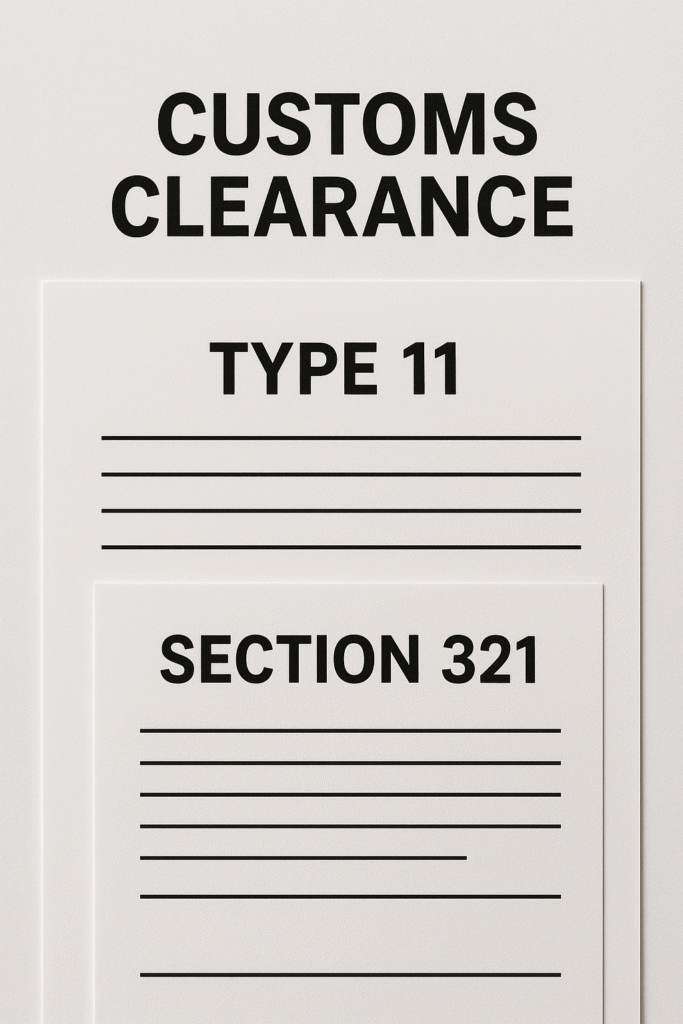Section 321 Customs of US and Border Protection code allowed shipments valued at $800 or less to enter the country without paying duties or taxes. This provision streamlined the import process for low-value goods, providing faster clearance and reducing costs for businesses and consumers alike.
As of August 29, 2025, Section 321’s de minimis exemption has been suspended globally, meaning all shipments entering the U.S., regardless of value or origin, must now undergo customs entry and may be subject to duties and fees. This marks a significant change for importers who previously relied on the duty-free benefits of Section 321.
Understanding how this suspension impacts supply chains and import procedures is crucial for businesses navigating cross-border trade. The following sections will explain the implications and offer guidance on adjusting to the new rules.
Understanding Section 321 Customs
Section 321 offers a streamlined customs process for shipments under specific value limits, enabling duty-free entry for qualifying goods. It sets clear eligibility criteria, defines applicable goods, and outlines the documentation required to benefit from its provisions.
Definition and Purpose
Section 321 is a regulation under U.S. Customs and Border Protection that allows certain low-value shipments to enter the country without paying duties or taxes. It is designed to simplify customs clearance by reducing paperwork and processing time for imports valued at $800 or less.
The primary purpose is to facilitate international commerce and reduce costs for both businesses and consumers by exempting small shipments from import duties. It applies specifically to goods arriving through express or mail carriers, promoting efficiency in cross-border trade.
Eligibility Requirements
To qualify under Section 321, shipments must be sent by a non-resident importer to a U.S. address or a U.S. importer through express or postal carriers. The goods must be for personal use or commercial purposes but cannot be intended for resale as part of a bulk shipment.
The shipment’s fair retail value must not exceed $800, and it should be the only shipment from the sender to the recipient on that day. Repeated shipments under $800 to circumvent duty payments can be flagged and denied clearance.
Applicable Goods and Value Limits
Eligible goods under Section 321 include most physical commodities, excluding items prohibited by law such as alcohol, tobacco, firearms, and certain controlled substances. The $800 de minimis threshold applies to the fair retail value of the goods at the point of shipment.
This value limit was raised from $200 to $800 in 2016 to expand duty-free access to more shipments. Goods exceeding this limit must undergo standard customs entry and may be subject to duties, taxes, and more complex processing.
Required Documentation
While Section 321 shipments are duty-free, they still require accurate customs documentation. Essential documents include an accurate commercial invoice or packing list showing a detailed description, quantity, and value of the goods.
Customs brokers or carriers usually handle clearance paperwork electronically. The declaration must clearly state that the shipment qualifies under Section 321, and supporting data must be consistent and truthful to avoid delays or penalties.
Complying With Section 321 Regulations
Section 321 exemptions require precise adherence to customs documentation, shipment classification, and valuation requirements. Failure to meet these standards can result in delays, fees, or even loss of duty-free eligibility.
Proper Filing Procedures
Importers must correctly complete customs entry forms and submit accurate shipment details. This includes providing the value of goods, description, country of origin, and importer identification number.
All shipments must be declared to U.S. Customs and Border Protection, even when claiming Section 321 exemption. Using a customs broker to manage filings can ensure compliance and reduce errors.
Electronic filing is mandatory, and accuracy in data helps prevent hold-ups. Illustratively, each shipment must not exceed $800 in fair retail value to qualify for Section 321.
Common Mistakes to Avoid
Misreporting shipment value is a frequent error; overvaluing goods risks unnecessary duty, while undervaluing risks penalties. Another common mistake is failing to properly identify the importer or neglecting to file required documents.
Improper classification of items or mixing shipments from multiple recipients can disqualify Section 321 eligibility. Some mistakenly assume all low-value shipments are exempt, but recent rule changes require customs checks on all shipments.
Clear labeling and separate packages per recipient help avoid compliance issues. Staying updated on the latest U.S. Customs regulations is critical to prevent common pitfalls.
Penalties for Non-Compliance
Failing to comply with Section 321 rules can lead to fines, shipment delays, or seizure of goods. Customs may impose penalties for false declarations or incomplete documentation.
Delays caused by non-compliance increase storage costs and disrupt supply chains. Repeat violations can trigger more severe enforcement actions.
Customs may require payment of back duties and taxes, negating any savings from Section 321 exemptions. Therefore, adhering to requirements helps mitigate financial and operational risks.



